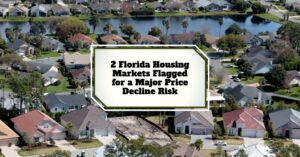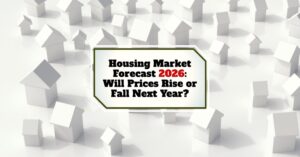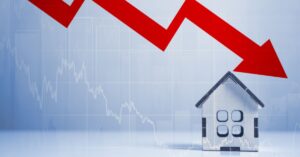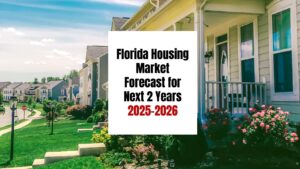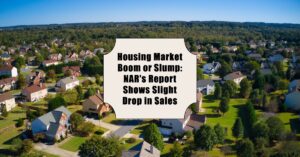After years of sizzling growth, things are definitely shifting in the Texas housing market. If you're wondering whether home prices might actually come down in the Lone Star State, you're not alone. And according to recent Zillow forecasts, the answer is a firm yes for some specific locations. In fact, the data points to 5 Texas Housing Markets Set For Double-Digit Price Decline by Early 2026, with Pecos, Big Spring, Alice, Raymondville, and Sweetwater expected to see drops of over 10% by March 2026. This isn't a statewide alarm bell, but it’s a significant heads-up for folks in these particular markets.
5 Texas Housing Markets at High Risk of Double-Digit Price Crash
Now, before we dive into those five areas, let's get a feel for the bigger picture in Texas. As of March 31, 2025, the average Texas home value sits around $307,629. This figure is actually down 1.4% over the past year, which tells us the market has already started to cool off from its previous fever pitch.
Homes are going to pending (meaning an offer has been accepted) in about 33 days on average. Interestingly, only 14.4% of sales are closing above the list price, while a hefty 65.1% are selling for under the asking price. This data strongly suggests that buyers are gaining a bit more leverage, and sellers are having to be more realistic. It's a market in transition, that's for sure.
So, with that statewide backdrop, let's zoom in on the projections.
5 Texas Areas Zillow Says Will See Prices Tumble in Double-Digits
Zillow, one of the big names in real estate data, regularly crunches numbers to predict where home values might be headed. Their latest forecast, using March 31, 2025, as a baseline, shines a spotlight on five specific Metropolitan Statistical Areas (MSAs) in Texas. These aren't the sprawling giants like Dallas or Houston, but smaller communities that might be more sensitive to economic ebbs and flows.
Here’s the breakdown of the projections for these areas:
| RegionName | RegionType | StateName | BaseDate | Projected Change by 30-04-2025 | Projected Change by 30-06-2025 | Projected Change by 31-03-2026 |
|---|---|---|---|---|---|---|
| Pecos, TX | msa | TX | 31-03-2025 | -0.4% | -2.8% | -12.7% |
| Big Spring, TX | msa | TX | 31-03-2025 | -0.5% | -2.7% | -11.4% |
| Alice, TX | msa | TX | 31-03-2025 | -1.3% | -3.8% | -11.3% |
| Raymondville, TX | msa | TX | 31-03-2025 | -1.2% | -4.1% | -11.2% |
| Sweetwater, TX | msa | TX | 31-03-2025 | -1.3% | -3.5% | -10.6% |
As you can see, by early 2026 (specifically March 31, 2026), all five of these areas are forecast to experience price drops exceeding 10%. Pecos leads the pack with a potential 12.7% decline. This is significant, and if you live in, own property in, or are considering buying in these areas, this is information you'll want to consider carefully.
Why These Areas? A Closer Look at the Dynamics
It’s natural to ask: why these specific towns? From my experience watching housing trends, several factors often come into play, especially in smaller markets.
- Pecos, TX (Projected Decline: -12.7%)
- Location & Economy: Pecos is deep in West Texas, a region heavily influenced by the oil and gas industry. When oil prices are high, areas like Pecos can boom. Conversely, when the energy sector slows down or if there's a perception of future slowdowns, employment can dip, and housing demand can weaken significantly. This “boom-and-bust” cycle is something I've seen impact West Texas towns repeatedly. The significant projected decline here strongly suggests an anticipation of softening in the energy sector or a correction from a previous oil-fueled price surge.
- My Take: A 12.7% drop is steep. It signals that the local economy, likely tied to oil and gas, might be facing headwinds. For anyone who bought at the peak of a recent boom, this could be a tough pill to swallow.
- Big Spring, TX (Projected Decline: -11.4%)
- Location & Economy: Like Pecos, Big Spring is in West Texas and has strong ties to the oil industry. It also serves as a regional hub for a broader agricultural area. The same vulnerabilities linked to energy price fluctuations apply here.
- My Take: Similar to Pecos, the reliance on a dominant industry makes Big Spring susceptible. If local job growth tied to that industry falters, housing often follows. This forecast might also reflect a market that overshot during the pandemic-era buying frenzy and is now recalibrating.
- Alice, TX (Projected Decline: -11.3%)
- Location & Economy: Alice is located in South Texas, between Corpus Christi and Laredo. Its economy has historically been linked to the oil and gas industry, agriculture, and government jobs (including a significant border patrol presence in the wider region).
- My Take: A double-digit decline here suggests a potential slowdown across a few of its economic drivers or perhaps an oversupply of housing relative to current demand. South Texas markets can sometimes be a bit more insulated than pure oil towns, but they aren't immune to broader economic shifts or changes in crucial local industries.
- Raymondville, TX (Projected Decline: -11.2%)
- Location & Economy: Raymondville is in the Rio Grande Valley in deep South Texas. Agriculture is a major economic pillar here, along with services and some light manufacturing. It's a smaller community, and its economic fortunes are often tied to the agricultural cycle and regional economic health.
- My Take: For areas like Raymondville, which aren't major metropolitan centers, housing markets can be very sensitive to local employment. If agricultural outputs are down, or if there's less disposable income circulating, it can cool housing demand quickly. The projected decline here might also point to affordability challenges even at lower price points when coupled with higher interest rates.
- Sweetwater, TX (Projected Decline: -10.6%)
- Location & Economy: Sweetwater is in West Central Texas, known historically for gypsum plants and now increasingly for wind energy. It also has a history with cotton and cattle.
- My Take: While the rise of wind energy is a positive long-term diversification, the housing market might be correcting from previous highs or feeling the pinch of broader economic slowing. Even with new industries, smaller towns can experience price volatility. It's possible that home construction or investor activity outpaced sustainable local demand in the recent past.
Understanding the “Why”: Factors Driving Potential Declines
Zillow uses complex algorithms, but from a boots-on-the-ground perspective, here are some common reasons why smaller MSAs like these might face steeper price corrections:
- Economic Specialization: As we've seen, many of these towns have economies that lean heavily on one or two industries (especially oil and gas). This lack of diversification makes them more vulnerable. If that key industry sneezes, the local economy, and by extension the housing market, can catch a serious cold.
- Population Fluctuations: Smaller towns can see more dramatic swings in population. If jobs related to a key industry dry up, workers may move away, reducing housing demand and putting downward pressure on prices.
- Supply and Demand Imbalances: Sometimes, a rush of new construction (perhaps during a boom period) can lead to an oversupply of homes if demand doesn't keep pace. In smaller markets, it doesn't take a huge number of excess homes to tip the scales.
- Interest Rate Sensitivity: While higher interest rates impact all markets, they can hit affordability harder in areas where incomes might not be rising as quickly. If borrowing costs go up too much, potential buyers simply can't qualify, leading to less demand and falling prices.
- The “Normalization” Effect: The last few years were anything but normal for real estate. Prices shot up almost everywhere. It's possible that these smaller markets experienced an unsustainable surge, and what we're seeing now is a correction back to more historically typical price levels or growth rates. I often tell clients that markets can't go up forever; gravity eventually plays a role.
What This Forecast Means for You
Whether you're a buyer, seller, or homeowner in these areas, this forecast is worth paying attention to.
For Potential Homebuyers:
- Opportunity Knocks? A declining market can mean lower prices and potentially more negotiating power. You might find homes that were out of reach a year ago are now more affordable.
- Patience Could Pay Off: If Zillow's timeline is accurate, prices might continue to soften through early 2026. Waiting could mean a better deal, but…
- Catching a Falling Knife: Timing the absolute bottom of a market is nearly impossible. Buying in a declining market also means your home's value could dip further after you purchase. It's crucial to think long-term and buy for the right reasons (you love the home, the location works for you), not just speculation.
- Due Diligence is Key: Scrutinize the local job market, understand why prices are falling, and get a thorough home inspection.
For Home Sellers:
- Adjust Expectations: If you're planning to sell in these areas, you may need to be realistic about your asking price. The days of multiple over-asking offers are likely gone for now.
- Price Competitively: Work with a local real estate agent who truly understands current market conditions. Overpricing your home in a declining market can mean it sits for a long time and ultimately sells for less.
- Presentation Matters More Than Ever: With more competition from other sellers and potentially fewer buyers, making your home shine (clean, decluttered, good curb appeal) is critical.
- Be Prepared for Longer Listing Times: Homes may take longer to sell than they did during the boom.
For Current Homeowners (Not Selling):
- Paper Value vs. Real Life: Remember, a decline in your home's estimated value is only a “paper loss” unless you need to sell or refinance immediately. If you love your home and your mortgage is manageable, these fluctuations are part of long-term homeownership.
- Focus on a Stable Foundation: The key is whether your personal financial situation is secure and your housing payment is comfortable. Market zigs and zags are less stressful when your own house is in order.
For Real Estate Investors:
- Proceed with Caution: Investing in a declining market is risky. While lower acquisition prices are tempting, you need to be confident that the market will eventually recover and that rental demand (if you're buying to rent) will remain stable or grow.
- Deep Local Knowledge Required: Generic investment strategies rarely work in highly localized, shifting markets. You'd need an almost unfair advantage in terms of local insight to make a successful bet here, in my opinion.
A Word on Forecasts and the Bigger Texas Picture
It's super important to remember that Zillow's numbers are forecasts, not guarantees. They are based on current data and trends, but things can change. Economic conditions can shift, local developments can alter a town's trajectory, and unforeseen events can always occur.
Also, and this is critical: these five MSAs do not represent the entire Texas housing market. Texas is a massive, diverse state. The dynamics in Pecos are vastly different from those in Austin, Dallas-Fort Worth, Houston, or San Antonio. While these major metro areas are also experiencing a slowdown and price moderation compared to the frenzy of 2021-2022, they generally have more diversified economies and different demand drivers. A double-digit decline in a major metro would be a much bigger story with far wider implications.
What I see in this data is a reflection of hyper-local market corrections. These smaller areas, often more tethered to specific industries or experiencing sharper boom-bust cycles, are adjusting more dramatically than the larger, more resilient economic hubs.
Factors I'll Be Watching Moving Forward
To see if these projections hold true, or if the situation changes, I'll be keeping an eye on several key indicators for these specific areas and for Texas generally:
- Oil and Gas Prices/Activity: For Pecos and Big Spring especially, this is paramount.
- Local Job Reports: Are these areas gaining or losing jobs? What sectors are growing or shrinking?
- Inventory Levels: Is the number of homes for sale rising rapidly? This usually signals downward pressure on prices.
- Days on Market: How long are homes taking to sell? If this number creeps up, buyers have more power.
- Mortgage Interest Rates: National rate trends will continue to influence affordability everywhere.
- Migration Patterns: Are people moving into or out of these specific Texas towns?
Final Thoughts: Stay Informed, Stay Local
The news is a significant piece of information, especially for those directly connected to Pecos, Big Spring, Alice, Raymondville, and Sweetwater. It underscores that not all real estate markets behave the same, even within a single state.
My advice? If these areas are on your radar, treat this forecast as a valuable data point. Dig deeper, talk to local real estate professionals who have on-the-ground experience, and consider your own financial situation and goals. The Texas real estate scene is always evolving, and staying informed is your best strategy for navigating its twists and turns.
Work With Norada in Texas's Shifting Market
As Texas enters a housing correction phase, savvy investors are capitalizing on price adjustments and increased inventory across key markets.
Norada offers a curated selection of turnkey rental properties in resilient Texas cities, providing consistent income and long-term appreciation potential.
HOT NEW LISTINGS JUST ADDED!
Connect with a Norada investment counselor today (No Obligation):
(800) 611-3060
Read More:
- Will the Texas Housing Market Crash as Prices Drop Across the State?
- Average Down Payment on a House in Texas in 2025
- Texas Housing Market Predictions for Next 2 Years: 2025-2026
- 10 Texas Cities Where Home Prices Are Predicted to Drop in 2025
- This Texas Housing Market is the Best in the U.S. [2024 Rankings]
- Texas Housing Market: Prices, Trends, Predictions
- Are Texas Home Sales Dropping ?
- How Much Do Real Estate Agents Make in Texas?
- 10 Cheapest Places to Live in Texas
- Is Texas a Good Place to Live: Explore the Cost, Jobs and Lifestyle

